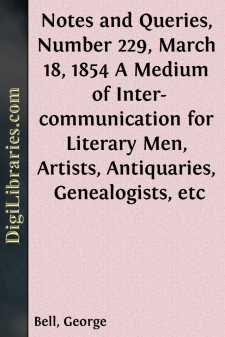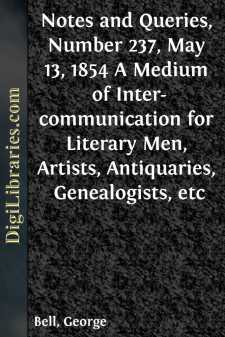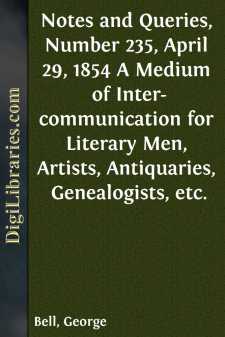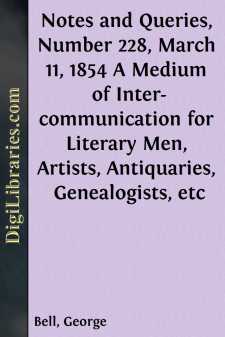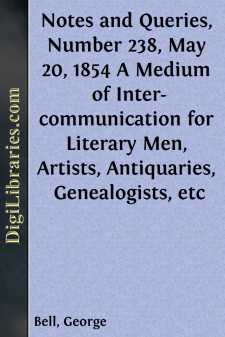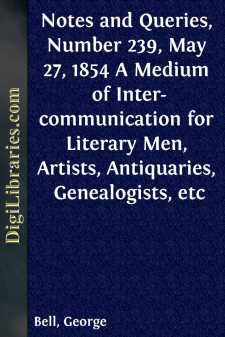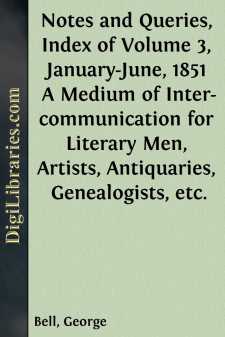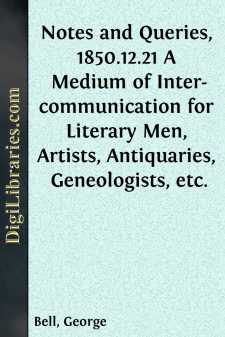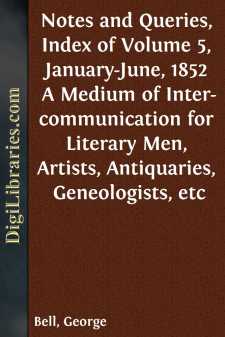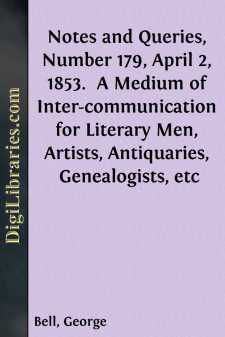Categories
- Antiques & Collectibles 13
- Architecture 36
- Art 48
- Bibles 22
- Biography & Autobiography 813
- Body, Mind & Spirit 142
- Business & Economics 28
- Children's Books 14
- Children's Fiction 11
- Computers 4
- Cooking 94
- Crafts & Hobbies 4
- Drama 346
- Education 46
- Family & Relationships 57
- Fiction 11828
- Games 19
- Gardening 17
- Health & Fitness 34
- History 1377
- House & Home 1
- Humor 147
- Juvenile Fiction 1873
- Juvenile Nonfiction 202
- Language Arts & Disciplines 88
- Law 16
- Literary Collections 686
- Literary Criticism 179
- Mathematics 13
- Medical 41
- Music 40
- Nature 179
- Non-Classifiable 1768
- Performing Arts 7
- Periodicals 1453
- Philosophy 64
- Photography 2
- Poetry 896
- Political Science 203
- Psychology 42
- Reference 154
- Religion 513
- Science 126
- Self-Help 84
- Social Science 81
- Sports & Recreation 34
- Study Aids 3
- Technology & Engineering 59
- Transportation 23
- Travel 463
- True Crime 29
George Bell
The author has not yet completed their profile.
Author's Books:
Sort by:
by:
George Bell
GOSSIPING HISTORY. "This is the Jew That Shakspeare drew." I do not know by whom or when the above couplet was first imputed to Pope. The following extracts will show how a story grows, and the parasites which, under unwholesome cultivation, adhere to it. The restoration of Shakspeare's text, and the performance of Shylock as a serious part, are told as usual. "In the dumb action of...
more...
by:
George Bell
"SHAKSPEARE'S RIME WHICH HE MADE AT THE MYTRE." In the third volume of Mr. Collier's valuable History of Dramatic Poetry (p. 275.) is the following passage, which forms part of a note: "Mr. Thorpe, the enterprising bookseller of Bedford Street, is in possession of a MS. full of songs and poems, in the handwriting of a person of the name of Richard Jackson, all copied prior to the...
more...
by:
George Bell
CURIOUS OLD PAMPHLET. Grubbing among old pamphlets, the following has turned up: "A Fragment of an Essay towards the most ancient Histories of the Old and New Worlds, connected. Intended to be carried on in four Parts or Æras. That is, from the Creation of all Things to the Time of the Deluge: thence to the Birth of Abraham: from that Period to the Descent of Jacob and his Family into Egypt: and,...
more...
by:
George Bell
WHERE ARE THE WILLS TO BE DEPOSITED? The difficulties thrown in the way of all literary and historical inquiries, by the peculiar constitution of the Prerogative Office, Doctors' Commons, have long been a subject of just complaint. An attempt was made by The Camden Society, in 1848, to procure their removal, by a Memorial addressed to the Archbishop of Canterbury, which we now print, because it...
more...
by:
George Bell
A LEADER FROM A FOREIGN NEWSPAPER: THE NEW RUSSIAN MANIFESTO. Mention was recently made, in Vol. ix., p. 218., of the valuable character of many of the leading articles in the continental journals, and a wish expressed that translations of them were more frequently communicated in our own papers to English readers. The great newspapers of this country are too rich in varied talent and worldwide...
more...
by:
George Bell
REPRINTS OF EARLY BIBLES. In 1833 the authorities of the Clarendon Press put forth a quarto reprint, word for word, page for page, and letter for letter, of the first large black-letter folio edition of 1611, of the present authorised or Royal version of the Bible. So accurate was it, that even manifest errors of the press were retained. It was published that the reader might judge whether the original...
more...
by:
George Bell
No description available
by:
George Bell
DIVISION OF INTELLECTUAL LABOUR. Every one confesses, I believe, the correctness of the principle called "Division of labour." But if any one would form an adequate estimate of the ratio of the effect produced, in this way, to the labour which is expended, let him consult Dr. Adam Smith. I think he states, as an example, that a single labourer cannot make more than ten pins in a day; but if...
more...
by:
George Bell
No description available
by:
George Bell
JACK. I wish to note, and to suggest to students in ethnology, the Query, how it comes to pass that John Bull has a peculiar propensity to call things by his own name, his familiar appellative of Jack? Of all the long list of abbreviations and familiar names with which times past and present have supplied us, that which honest Falstaff found most pleasing to his ears, "Jack with my familiars!"...
more...


